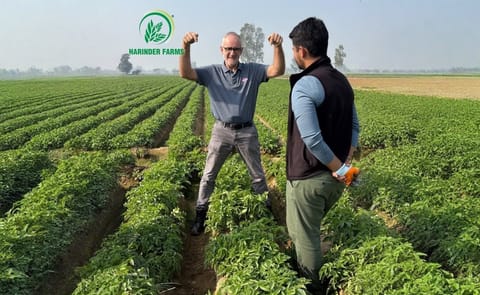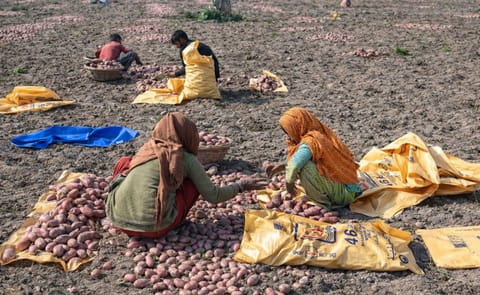Could a 'super' potato, fortified with iron and zinc, tackle malnutrition? (Courtesy: Bloomberg)
Scientists develop 'super spud' in a bid to prevent stunting

Scientists are creating a “super potato”, fortified with iron and zinc, in a bid to tackle malnutrition in developing countries.
Millions of people around the world suffer micronutrient deficiencies – a lack of essential vitamins and minerals. This can lead to stunting in children, who then go on to suffer cognitive delays, weakened immunity and disease. Pregnant women who lack micronutrients are more likely to have babies with defects or low birthweight.
Potato is a staple crop in many parts of the world and researchers at the International Potato Centre (CIP) in Peru believe that a biofortified variety could have an important role to play in improving diets.
After rice and maize potato is the third most consumed food in the world so increasing its micronutrient content would make a significant difference to people’s health around the globe, said Dr Oscar Ortiz, director of the CIP.
Dr Oscar Ortiz, director of the CIP:
Work on biofortification of the potato began in 2004 as researchers looked through a gene bank of around 200 varieties from countries around the Andes - where the potato originated.
Researchers identified 16 native varieties with high levels of iron, zinc and vitamin C and then spent more than a decade crossing these types with each other to produce varieties with even higher levels of micronutrients.
These were then crossed with other types of potato with high yields and good resistance to disease such as blight. These varieties have 40 to 80 per cent more iron than types currently grown in the Andes.
Now these potatoes are being tested to see if they grow in other parts of the world: clones are being grown in Rwanda and Kenya and will soon be introduced to Bhutan, Bangladesh and Nepal.
Researchers are also conducting bioavailability testing to see whether the increased iron content of the potato is absorbed by the human body. Once this is confirmed Dr Ortiz believes that the new varieties will be available within the next two years.
Studies show that consuming 600g of these potatoes a day, as is common in most areas of the Peruvian highlands, could provide up to 75 per cent of the recommended daily allowance of iron and zinc.
CIP’s approach has already been tested with sweet potato fortified with vitamin A – groundbreaking work which in 2016 won the World Food Prize, the “Nobel prize” for food.
New research has shown that since 2013 more than 2.3 million households in Africa and Asia have been given sweet potato cuttings to grow themselves.
Dr Ortiz:
Dr Ortiz added that fortifying food at source was better than doing it during the production process. The UK government has announced it intends to fortify flour with folic acid to reduce the number of babies born with spina bifida or anencephaly, where the majority of the brain never develops.
Millions of people around the world suffer micronutrient deficiencies – a lack of essential vitamins and minerals. This can lead to stunting in children, who then go on to suffer cognitive delays, weakened immunity and disease. Pregnant women who lack micronutrients are more likely to have babies with defects or low birthweight.
Potato is a staple crop in many parts of the world and researchers at the International Potato Centre (CIP) in Peru believe that a biofortified variety could have an important role to play in improving diets.
After rice and maize potato is the third most consumed food in the world so increasing its micronutrient content would make a significant difference to people’s health around the globe, said Dr Oscar Ortiz, director of the CIP.
Dr Oscar Ortiz, director of the CIP:
“Potato already has proteins, iron, zinc and vitamin C and it is also an extremely good source of fibre. It’s a well balanced food if consumed boiled or baked. But we can make it even better.”Potatoes may have developed an image problem in recent years with the move to “low carb” diets but Dr Ortiz believes this is mainly because of the way they are consumed as chips or fries.
“If we can confirm this, which is a critical milestone, the potato will be available in 2021.”
Work on biofortification of the potato began in 2004 as researchers looked through a gene bank of around 200 varieties from countries around the Andes - where the potato originated.
Researchers identified 16 native varieties with high levels of iron, zinc and vitamin C and then spent more than a decade crossing these types with each other to produce varieties with even higher levels of micronutrients.
These were then crossed with other types of potato with high yields and good resistance to disease such as blight. These varieties have 40 to 80 per cent more iron than types currently grown in the Andes.
Now these potatoes are being tested to see if they grow in other parts of the world: clones are being grown in Rwanda and Kenya and will soon be introduced to Bhutan, Bangladesh and Nepal.
Researchers are also conducting bioavailability testing to see whether the increased iron content of the potato is absorbed by the human body. Once this is confirmed Dr Ortiz believes that the new varieties will be available within the next two years.
Studies show that consuming 600g of these potatoes a day, as is common in most areas of the Peruvian highlands, could provide up to 75 per cent of the recommended daily allowance of iron and zinc.
CIP’s approach has already been tested with sweet potato fortified with vitamin A – groundbreaking work which in 2016 won the World Food Prize, the “Nobel prize” for food.
New research has shown that since 2013 more than 2.3 million households in Africa and Asia have been given sweet potato cuttings to grow themselves.
Dr Ortiz:
“We are not saying only eating potato will solve the iron deficiencies of the world but it will be part of a diverse diet where other sources of nutrients are needed.”The biofortified sweet potato also contains high levels of vitamins B6 and C, manganese and potassium.
“Their work has shown that 120g of sweet potato a day can provide 100 per cent of a child’s daily vitamin A intake. It’s a really good example of how biofortification can contribute to reducing micronutrient deficiency.”
“If it becomes part of the diet and is consumed every day it is a much more sustainable way of accessing micronutrients. Sweet potatoes and potatoes are cultivated by vulnerable people who are far away from governments so having these crops is a better option for them.”
Dr Ortiz added that fortifying food at source was better than doing it during the production process. The UK government has announced it intends to fortify flour with folic acid to reduce the number of babies born with spina bifida or anencephaly, where the majority of the brain never develops.
Like to receive news like this by email? Join and Subscribe!
Get the latest potato industry news straight to your WhatsApp. Join the PotatoPro WhatsApp Community!
Highlighted Company
Sponsored Content
Sponsored Content
Sponsored Content
Sponsored Content









